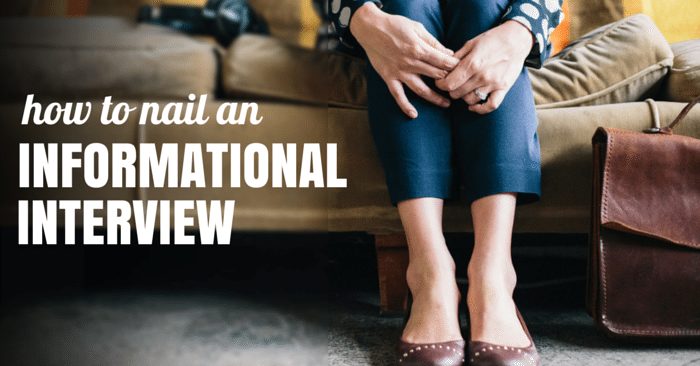Are Informational Interviews Part of Your Networking Strategy?

You might be thinking: Interviews are stressful and a lot of work. Why would I bother with one that doesn’t potentially lead to an offer letter?
Here’s the thing: while informational interviews aren’t connected to specific positions like traditional job interviews, they can be super helpful in scoring your next gig. They can provide valuable insight, give you a peek into a company’s culture, and help you make decisions about things like going back to school or switching careers. Also, having an inside contact may help your resume get noticed when it’s finally time to apply for the job.
How to Get an Informational Interview
If you already have a contact at your company of interest, you’re one step ahead of the game. They’ll have a read on whether it makes the most sense to put you in touch with HR or do an email introduction with someone in the department that’s most relevant to your interests.
If you’re starting from scratch, you’ll need to do some research to determine the most appropriate contact. LinkedIn and company websites are good resources for this, as is Rapportive, an email guessing tool. Once you’ve got contact info, draft a brief, cover letter-ish email requesting an exploratory interview. In one interview request, I wrote:
I’ve been keeping an eye on <company name>’s “Careers” page for marketing-related opportunities. Despite not seeing any, I thought I’d reach out and express my interest in working for <company name>.
And then, after writing a bit about my work experience and outlining exactly what I loved about the organization, I simply wrote: “I am including my resume for your reference. Would you be open to meeting with me for an exploratory interview?” And it worked!
How to Prepare
Technically, since you’re not vying for a particular job, there’s less at stake with an informational interview. But, that doesn’t mean you should just wing it. Show that you respect your interviewer’s time and make the most of the opportunity. Research the company the same way you would for a job interview and have questions ready. Remember that you requested this interview, so the person you’re meeting will likely expect you to guide the conversation.
Bring copies of your updated resume, and be prepared to answer the question “Why don’t you tell me about yourself.” Kathryn Minshew, Founder and CEO of The Muse, has a great formula for answering this simple, yet tricky question. It’s called “Present-Past-Future.” Here’s what a “Present-Past-Future” answer might look like:
Currently, I’m an office manager at a small startup company. My prior experience as an administrative assistant allowed me to hone my organization and time management skills. I know the next step for me is to parlay those skills into a more operations-focused role at a larger company like XYZ Inc. I’ve been following XYZ Inc. for about a year and would love to learn more about your operations department.
The “Future” part of your formula is where you talk about why you’re interested in the interviewer’s company/field/career path. From there, you can easily lead into your prepared questions.
The Interview Went Well! Now what?
Just like with a traditional interview, always send a thank you email within 24 hours of your meeting. But, because you haven’t applied for a particular job, you’re going to need to be a bit more creative with any additional follow-up. If your interviewer let you know that it was cool to stay in touch or offered to answer any additional questions, take them up on it. Send them an email within the next couple months letting them know you read that book they recommended or followed some of their advice. Or, if you read something cool about their company in the news, send a congratulatory note. Or, say you did something cool like publish an article, help launch your company’s website, or get a new certification? Let them know in a sincere, non-braggy way. Words like “I was excited about this and wanted to share it with you” usually go over well.
Once your dream job opens up, make sure to make the most of all the work you put into pulling off a successful informational interview. In your cover letter, mention that you recently met with Ms. XYZ (your new contact) to learn more about the company. If you’ve managed to establish a relationship with your interviewer, ask if you can use them as a reference. Did you gain an insight on the company’s values, goals, or current priorities? Make sure to mention those and show the hiring manager that you’ve done your homework.
Most importantly, don’t worry if you don’t see an immediate pay-off from your efforts. The informational interview can be a powerful component of your networking strategy and also good practice for verbal communication and active listening skills. Even if you’re not in the market for a new job, why not try one out? I guarantee you’ll learn something.
Have you participated in an informational interview, either as the interviewer or interviewee? Any tips or advice to share?
Thanks a lot for this tips on informational interview because i am new to this term, didn’t know this before about informational interview and in next week i have informational interview so had to study about it, and this article cleared my doubts so cheers to this article.